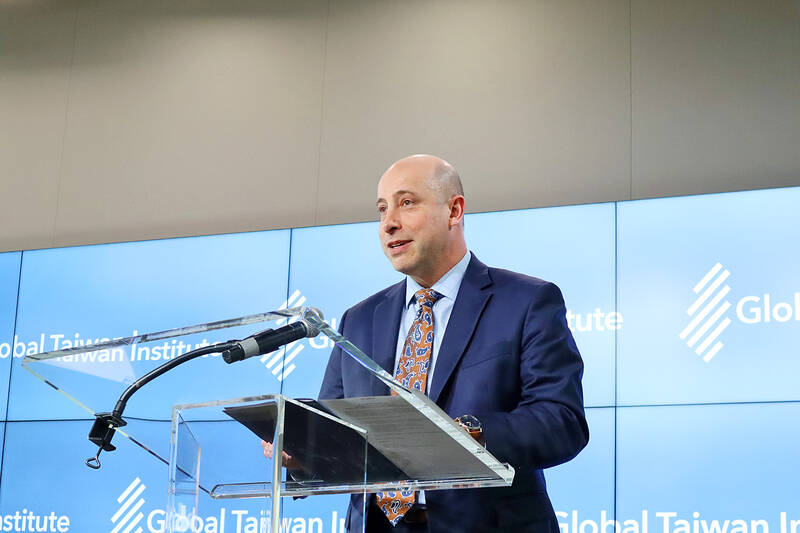The US “strongly supports” Taiwan to enhance its whole-of-society resilience, US Deputy Assistant Secretary of Defense for China, Taiwan and Mongolia Michael Chase said at the Global Taiwan Institute’s annual symposium in Washington on Wednesday, adding that the Legislative Yuan should approve the Executive Yuan’s military budget in favor of “Taiwan’s military defense modernization.”
“Taiwan must be able to deter, degrade and delay potential Chinese aggressions,” even though a cross-strait conflict is neither imminent nor inevitable, Chase said in his closing remarks.
“We support Taiwan’s military in its efforts to acquire asymmetric [warfare] capabilities that are low-cost, mobile, distributed, resilient and lethal,” he said.

US Deputy Assistant Secretary of Defense for China, Taiwan and Mongolia Michael Chase speaks at the Global Taiwan Institute’s annual symposium in Washington on Wednesday.
Photo: CNA
“Asymmetric capabilities must also be complemented by corresponding modern defense concepts, through which Taiwan’s forces can effectively conduct joint decentralized operations in what would be a highly contested wartime environment,” he added.
“Below the level of armed conflicts, Taiwan’s capabilities to respond effectively in an asymmetric way against the People’s Republic of China’s [PRC] use of gray-zone military activities are also important,” he said.
The war in Ukraine has demonstrated that “whole-of-society resilience can provide significant advantages against larger aggressors, as well as contribute to a stronger overall deterrence posture,” Chase said.
He applauded Taiwanese defense reforms in the past few years, such as the establishment of the All-out Defense Mobilization plan, the extension of military conscription from four months to one year and the establishment of an interagency task force to improve “whole-of-society” resilience.
“Taiwan’s allocation and investment of defense resources ... must be commensurate with the threats and challenges it faces,” Chase said, adding the US is “encouraged” that the Executive Yuan’s military budget for next year “continues to prioritize defense modernization.”
President William Lai’s (賴清德) administration promotes national defense innovations to “rapidly leverage commercial technologies for asymmetric capabilities,” Chase said. “US-Taiwan industry-to-industry partnerships would also play a valuable role in this regard.”
For example, 26 US companies last month visited Taiwan to explore uncrewed aerial systems (UAS) and counter-UAS business opportunities, Chase said.
The US will continue to “accelerate Taiwan’s acquisition of necessary military capabilities,” he said.
Traditional defensive trade mechanisms such as direct commercial sales and foreign military sales will be continued to provide material and non-material support for Taiwan, Chase said.
Other security access tools such as US presidential drawdown authority and foreign military financing also are used to bolster Taiwan’s military modernization, he added.
“We, the [US] Department of Defense, and our colleagues across the interagency will continue to work with our allies and partners to advance our shared vision for a free and open Indo-Pacific, despite the PRC’s destabilizing behavior,” Chase said.
China continues to disrupt the “status quo” in the Taiwan Strait and engages in “what is now a years-long campaign to intimidate and coerce Taiwan, he said, adding that Beijing’s Joint Sword-2024B military drills around the nation on Monday were “irresponsible, disproportionate and destabilizing.”
“These types of provocative military actions, as well as the frequent air and maritime incursions across the median line [of the Taiwan Strait], erode the long-standing norms that have maintained peace and stability in the region for decades. These activities by the PRC ... increased the risk of miscalculation and escalation,” he said.
American Institute in Taiwan Director Raymond Greene in a prerecorded opening address at the symposium also mentioned China’s Joint Sword-2024B exercise.
“US support for Taiwan is bipartisan, bicameral and principled,” he said. “Though different presidents have different management and rhetorical styles, they have all shared a common commitment to promoting cross-strait dialogue, maintaining cross-strait peace and stability, and enhancing Taiwan’s preparedness against regional challenges,” he said.
“Unfortunately, in response to what was a routine annual speech, the [Chinese] People’s Liberation Army conducted joint military drills on Oct. 14 in the Taiwan Strait and around Taiwan,” Greene said.
“Such actions, together with a sustained pattern of diplomatic and economic coercion, have served to undermine peace and stability across the Taiwan Strait and in the broader region,” he said, adding that it is “obviously of serious concern to the US and the international community.”
Source: Taipei Times - 2024/10/18




















